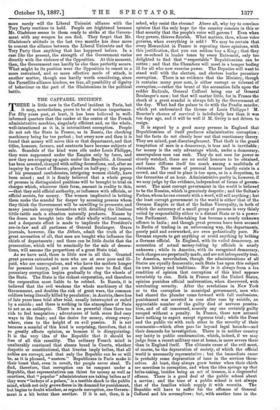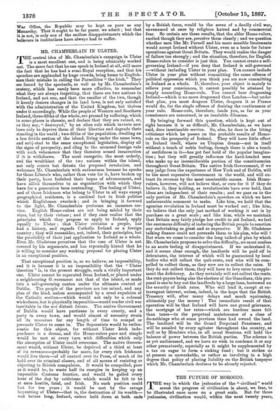THE CAFFAREL INCIDENT.
THERE is little new in the Caffarel incident in Paris, but it may, nevertheless, prove to be of serious importance. For fifty years past, at least, it has been believed in well- informed quarters that the canker at the centre of the French administrative machine, singularly efficient and, on the whole, well-intentioned as it is, is intermittent corruption. People do not rob the State in France, as in Russia, the checking machinery being far too perfect ; but every now and then it is found that money will move this or that department, and that titles, honours, favours, and contracts have become subjects of sale. Scandals of the kind were rife under Louis Philippe, they were suppressed under the Empire only by force, and now they are cropping up again under the Republic. A General has been arrested, charged with selling decorations, and, after an inquiry by a Court of Honour, placed on half-pay; the papers of his presumed confederates, intriguing women chiefly, have been seized ; and it is firmly believed that a whole group of persons in distinguished positions will be brought to trial on charges which, whatever their form, amount in reality to this, —that they sold official authority, or influence with officials, or official secrets, for money. The women implicated in bribing them make the scandal far deeper by accusing persons whom they think the Government will be unwilling to prosecute, and many journals occupy themselves with detailing the libellous tittle-tattle such a situation naturally produces. Names by the dozen are brought into the affair wholly without reason, and a desperate effort is made to implicate the President's son-in-law and all partisans of General Boulanger. Grave journals, however, like the Dibats, admit the truth of the great accusation of all, that men are bought who influence the chiefs of departments ; and there can be little doubt that the prosecution, which will be nominally for the sale of decora- tions, will assume the proportions of a great State trial.
As we have said, there is little new in all this. Granted great powers entrusted to men who are at once poor and ill- paid, who are unscrupulous, and who have the modern hunger for personal luxury, and you are almost sure to find that pecuniary corruption begins gradually to clog the wheels of the State. The State is the richest corporation, and therefore the corporation most liable to be robbed. In Russia, it is believed that the evil weakens the whole machinery of the Government, and doubles the risk of great wars, the common soldiers being literally killed by peculation; in Austria, there has of late years been trial after trial, usually interrupted or ended by a suicide ; and there is nothing in the atmosphere of Paris to act as an antiseptic. There is no powerful class there too rich to feel temptation ; adventurers of both sexes find easy ways to the front ; and the desire for money, strong every- where, rises to the height of an evil passion. It is not because a scandal of this kind is surprising, therefore, that it so greatly affects opinion, as because it is disappointing. It is the very idea of the Republic that it should be free of all this rascality. The ordinary French mind is unalterably convinced that abuses breed in Courts, whether despotic or constitutional, that liveries imply bribes, that all nobles are corrupt, and that only the Republic can be or will be, as it is phrased, "austere." Republicans in Paris make it their boast that, even in revolt, the people never steal. To find, therefore, that corruption can be rampant under a Republic, that representatives can third for money as well as courtiers, that " popular " administrators are taking bribes as if they were "lackeys of a palace," is a terrible shock to the public mind, which not only grows fierce in its demand for punishment, but begins to doubt whether, as regards corruption, one Govern- ment is a bit better than another. If it is not, then, it is
asked, why resist the stream? Above all, why try to convince opinion that the only hope for the country consists in this or that security that the people's voice will govern ? Even when they govern, thieves flourish. What matters, then, whose voice governs, when everything is sold We may be certain that every Monarchist in France is repeating these opinions, with this justification, that you can seldom buy a King ; that they are re-echoed in louder tones by every Extremist, only too delighted to find that "respectable" Republicanism can be rotten ; and that the Chambers will meet in a temper boding ill for all who now exercise power. The Deputies will want to stand well with the electors, and electors loathe pecuniary corruption. There is no evidence that the Ministry, though it contains many poor men, is either corrupt or tolerant of corruption,—rather the brunt of the accusation falls upon the redder Radicals, General Caffarel being one of General Boulanger's men: but that will matter little, for in France the shock of a great scandal is always felt by the Government of the day. What had the palace to do with the Praslin murder, which yet undermined the throne of Louis Philippe? M. Rouvier's chance of survival is indefinitely less than it was ten days ago, and it will be well if M. Grevy is not driven to resign.
It is argued by a good many persons in England that Republicanism of itself produces administrative corruption ; but the facts do not clearly bear out that reactionary theory. They are mixed, past disentanglement. That theft is the grand temptation of men in a democracy, is true and is inevitable ; for money is the only advantage which, under a democracy, unscrupulous men can seek. They do not care for power so closely watched, there are no social honours to be obtained, and fame diffuses itself too much among a multitude of claimants. The sense of personal honour hardly exists in a crowd, and the road to place is too open, as in a despotism, to the favourites of an hour. Administrative purity is, however, if we may judge by the evidence, independent of forms of govern- ment. The most corrupt government in the world is believed to be the Russian, which is genuinely despotic ; and the Sultan's Pashas, whom he can execute with a word, will Bell anything ; but the least corrupt government in the world is either that of the German Empire or that of the Indian Viceroyalty, in both of which the autocracy of a small group of persons is very thinly veiled by responsibility either to a distant State or to a power- less Parliament. Bribe-taking has become a nearly unknown offence in India ; and though great persons have been accused in Berlin of trading in an unbecoming way, the departments, poorly paid and overworked, are even pedantically pure. No German expects to get anything or avoid anything by bribing a German official. In England, with its veiled democracy, an accusation of actual money-taking by officials is nearly unknown ; while in America, with its recognised democracy, such charges are perpetually made, and are not infrequently true. In America, nevertheless, though the administrations of all States are equally democratic, each State has upon this subject its own history and traditions. Nor is it always from a lax condition of opinion that corruption of this kind appears invariably to rise. Both in France and the United States, opinion punishes official malversation, when discovered, with unrelenting severity. After the revelations in New York as to the corruption in municipal government, men who had shared the plunder came forward with full confessions, punishment was arrested in case after case by suicide, an appreciable number of the guilty died of nervous prostra- tion, and of all concerned, scarcely any one certainly guilty escaped without a penalty. In France, those now accused have nothing to expect except rigorous trial ; while the Press and the public vie with each other in the severity of their comments—which often pass far beyond legal bounds—and their demands for investigation. There is in neither country any laxity in public condemnation, which, indeed, if we may judge from a recent military case at home, is more severe there than in England itself. The ultimate cause of the evil must, of course, be the depravation of society, of which the official world is necessarily representative ; but the immediate cause is probably some depravation of tone in the services them- selves. At least, they always grow better when their chiefs are merciless to corruption, and when the idea springs up that bribe-taking, besides being an act of treason, is a disgraceful offence. There is a good deal of the public school about a service ; and the tone of a public school is not always that of the families which supply it with recruits. The Republic will have to suffer for the offences of General Caffarel and his accomplices ; but, with another tone in the War Office, the Bspublic may be kept as pure as any Monarchy. That it ought to be far parer, we admit ; but that it-ia,not, is only one of the endless disappointments which the believers in institutions have always had to suffer.



































 Previous page
Previous page